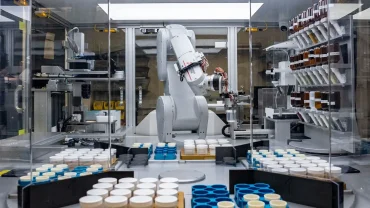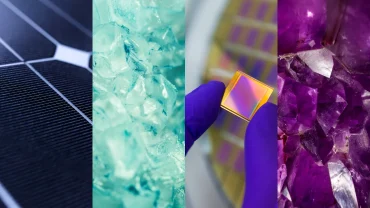
- Autonomous Research
- Deep Tech
- Investing
AI Materials Discovery Draws Record Venture Capital Funding
5 minute read

AI materials discovery platforms attract record venture capital as autonomous labs accelerate research breakthroughs tenfold
Key Takeaways
- $1.3 billion in venture capital funding has flowed into AI-driven materials discovery platforms, with investment growing from $20 million in 2020 to $168 million by mid-2025.
- Over 380,000 stable materials identified by Google DeepMind’s GNoME AI system, with 736 already synthesized experimentally, demonstrating 10x faster discovery rates than traditional methods.
- 50+ industry experts convened at NREL in May 2025 to address the “valley of death” problem where promising lab discoveries fail to become viable commercial products.
Introduction
Artificial intelligence transforms materials science by accelerating the journey from laboratory discovery to commercial viability. More than 50 experts recently gathered at the National Renewable Energy Laboratory to explore how AI-powered autonomous experimentation can bridge the notorious “valley of death” plaguing materials development.
The convergence of AI, robotics, and advanced computing enables researchers to conduct experiments at unprecedented scale and speed. This technological shift addresses critical bottlenecks in the research-to-industry pipeline that have historically prevented promising materials from reaching market applications.

Key Developments
NREL hosted the Autonomous Research for Real-World Science workshop in May 2025, bringing together leaders from materials science, chemistry, and robotics. The event marked a pivotal transition in industry thinking from questioning AI capabilities to focusing on implementation speed and real-world impact.
Autonomous science systems now integrate materials synthesis, characterization, and modeling into unified workflows. These platforms promise “born-qualified” materials by incorporating cost, scalability, and performance considerations from the earliest research stages rather than addressing these factors during later development phases.
Current laboratory processes designed for human operation create significant bottlenecks incompatible with autonomous systems’ precision and speed. Workshop participants identified the need for new AI reward functions, modular workflows, and standardized data-sharing platforms to overcome legacy equipment barriers.
Market Impact
Venture capital investment in materials discovery applications reaches $1.3 billion in cumulative funding, reflecting strong market confidence in AI-driven research platforms. Investment in computational materials science surged from $20 million in 2020 to $168 million by mid-2025, representing over 700% growth.
Major transactions include Saint-Gobain’s $1.2 billion acquisition of Chryso, demonstrating corporate appetite for advanced materials capabilities. The United States commands the majority of global funding and deal volume, followed by Europe in the competitive landscape for materials innovation.
Self-driving laboratories achieve materials discovery rates up to 10 times faster than traditional methods while reducing costs and environmental impact. These efficiency gains attract significant corporate investment as companies seek competitive advantages in product development cycles.

Strategic Insights
The materials technology industry undergoes fundamental transformation as AI enables new business models and accelerated development timelines. Companies leveraging AI tools like Google DeepMind’s GNoME and Microsoft’s MatterGen gain substantial advantages in identifying high-potential compounds from millions of candidates.
Traditional materials research faces a structural challenge where promising laboratory discoveries fail commercial translation due to scale-up difficulties. Autonomous workflows address this problem by integrating manufacturing considerations throughout the research process rather than as an afterthought.
The convergence creates winners among companies investing in AI-powered research platforms while potentially disadvantaging organizations relying on conventional development approaches. Industries requiring advanced materials for decarbonization and next-generation technologies particularly benefit from accelerated discovery capabilities.
Expert Opinions and Data
“The true revolution in autonomous science isn’t just about accelerating discovery but about completely reshaping the path from idea to impact,” states Steven R. Spurgeon, materials data scientist at NREL who organized the workshop. He emphasizes engineering research workflows to ensure materials are “born-ready” for industrial scale.
Sergei V. Kalinin, professor at the University of Tennessee, Knoxville, describes the workshop’s significance: “The energy was palpable. It marked a pivotal moment where the community’s conversation shifted from ‘What can automation do?’ to ‘How quickly can it deliver real-world impact?'”
Nathan Park, senior research staff member at IBM Research, highlights industry urgency: “The traditional materials R&D cycle is a significant bottleneck. By combining deep domain expertise with AI platforms and understanding market challenges, we can build a powerful innovation pipeline.” Google DeepMind reports that GNoME successfully narrowed millions of candidate materials to identify over 380,000 predicted stable compounds.

Conclusion
AI-powered autonomous experimentation establishes a new paradigm for materials research and development, combining discovery, synthesis, and optimization in integrated workflows. The substantial venture capital investment and corporate acquisition activity demonstrate market confidence in these transformative capabilities.
Success depends on continued improvements in data quality, cross-sector collaboration between industry and research institutions, and overcoming legacy equipment limitations. The technology positions early adopters to accelerate innovation cycles while addressing critical materials needs for energy transition and advanced manufacturing applications.








